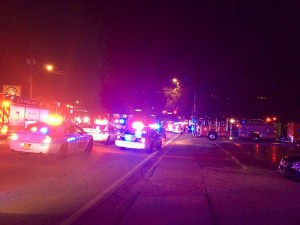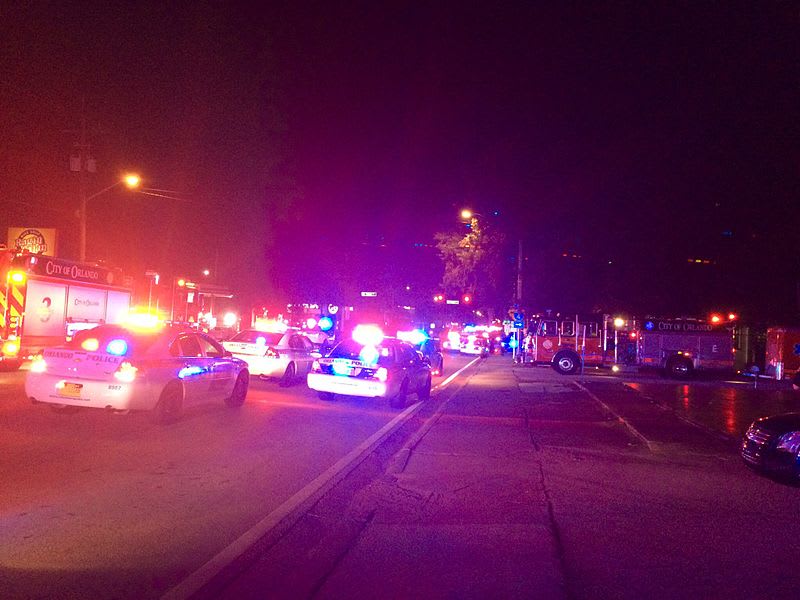Even if the victims of a tragedy offend your religious sensibilities, you’re still not God’s designated spokesman.

After being incommunicado for three days following the combination of Shabbos and Shavuos, I did what so many of us did: I logged onto Facebook. I posted a few pieces of lighthearted ephemera, as one does, but then I started to see references to Orlando in my newsfeed. After noticing two or three such references, I headed to Google and was appalled to learn of the horrific massacre that had occurred in Pulse, a gay club.
It was disappointing – though not surprising – to see that politicians on both sides had already jumped on this. This side blamed gun violence and called for stricter weapons bans. That side called it terrorism and called for tougher scrutiny in entering the country. Each side blamed the other for the tragedy because, if you’d only listened to us in the first place, this could never have happened.
While I dislike the politicization of tragedies, especially so soon in the wake of the event, it has come to be expected. What I truly dreaded, given the identity of the targeted victims, was the coming of the self-appointed prophets who would invariably tell us that this was God’s wrath. Sadly, such holier-than-thou posturing has become expected when the victims of a catastrophe offend someone’s religious sensibilities. It was inescapable during the AIDS epidemic of the 1980s. In the wake of hurricane Katrina, New Orleans was likened to Sodom and Gomorrah. There are even those who say that 9/11 was the “wrath of God” based on their objection to (name virtually anything). How could it not be coming in this instance as well?
While there was less of this attitude than I had feared, I did see two instances of it within the first 24 hours of becoming aware of the incident. In the first, an Orthodox Jew shot a video in which he called the victims sinners and clarified that “God hates sin.” He also said “good for him” about the shooter. The second was a pastor who claimed that the victims “deserve what they got” and that Orlando was “a little safer” without them. More are no doubt coming.
There’s so much wrong here, I don’t even know where to begin.
Let’s start with the fellow who decided that the victims were “sinners.” The first problem is holding others to your religious beliefs because – you know what? – others may have different beliefs. And, according to many other belief systems, you’re the sinner. For example, let’s imagine that, after the recent shooting in Tel Aviv, someone had said, “Not believing in Jesus is a sin and God hates sinners, so that’s what you get.” I imagine that would not have been an acceptable statement to our aforementioned Jewish vlogger.
But let’s say that, according to your belief system, they were sinners. Fine. You know what else is a sin? Sabbath violation. Gossip. Being dishonest in business. Hurting people’s feelings by saying hateful things. And you know who else is a sinner? You. Also me. All of us. As King Solomon put it, “There is no one on Earth so righteous that he only does good and doesn’t sin” (Ecclesiastes 7:20). It’s why we need Yom Kippur. No one gets to say, “I’m good” and just stay home.
You may want to split hairs that your sins are “little” and other people’s sins are “big.” That actually works against your case. The greater you are, the more responsible you are for your actions. For example, why was Moses punished so harshly just for hitting a rock (Numbers chapter 20)? Because he was on the level of Moses. If you’re really that righteous, your “little” sins are quite big indeed.
So, if we’re all sinners, do victims of tragedies really “deserve what they got?” The prophet Ezekiel says: “Do I desire at all that a wicked person should die? says the Lord God. Rather, he should turn from his ways and live” (Ez. 18:23). In case you missed it, he reiterates: “…I have no pleasure in the death of the wicked, but that the wicked turn from his way and live…” (ibid. 33:11). If God says He takes no pleasure in such things, what human should deign to suggest otherwise? People justify that they are God’s friends and others are the enemy, but Proverbs tells us (24:17), “Do not rejoice when your enemy falls.…” Again, don’t presume to know these things better than what God actually tells us.
Just last week, in our discussion of verbal oppression, we cited the Talmud (Baba Metzia 58b) that it’s sinful to suggest to one who is suffering that his troubles are punishments for his own misdeeds, the way that Job’s friends did. This is why you never pay a condolence call and hear someone say, “Yeah, well, your grandfather drove on Shabbos….” If you have such ideas, they’re best kept to yourself.
There are times when we can debate, but this is not about wedding cakes or bathroom access. Nothing justifies the actions perpetrated by Orlando shooter Omar Mateen. If the victims of a tragedy happen to offend your religious sensibilities, that’s no license to decide that you’re God’s designated spokesman. Are acts of violence perpetrated against Jews in the Intifada proof of Allah’s wrath? I assume not. Violence targets every demographic; it’s awfully selective to decide that only acts perpetrated against others represent the wrath of Your Understanding of God.
Murder is murder. It is never okay. It is the act of evil men, nothing more and nothing less. In this matter, God made His thoughts clear when He said “Thou shalt not murder” (Exodus 20:13). When such things happen – as they unfortunately will – siding with the murderer against the victims is also siding against God. Perhaps we would be better off remembering another of His commandments, from Leviticus 19:18, “…love thy neighbor as thyself.”
The words of this author reflect his/her own opinions and do not necessarily represent the official position of the Orthodox Union.

